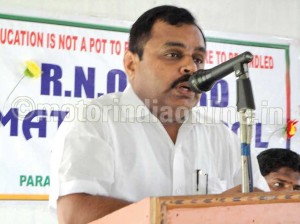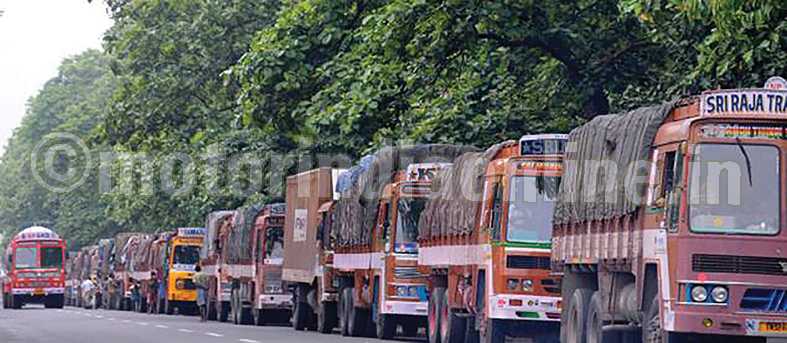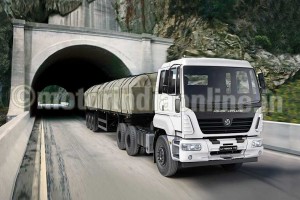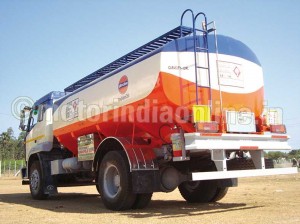According industry status to the transport sector essential for market revival
It’s not much of an exaggeration to state that if Namakkal trucking segment sneezes, the all India road transport operations will catch cold – possibly an apt acknowledgement for the dominance of the unofficial trucking capital of India Namakkal town, the headquarters Namakkal district in T.N. about 60 km from the steel city Salem. The current dreary business scenario therein is lot more serious than the frivolous sneezing or cold like bothersome afflictions, with over one third of the trucks numbering about 54,000 in the region idling for want of work; and the active fleet operators fighting against the low rentals, increasing operational costs on diesel and maintenance, driver shortage et.al. to barely stay afloat. The economic downturn has adversely impacted many of the players in the CV domain apart from the OEMs. To understand the gravity of the situation, role played by the Namakkal Taluk Lorry Owners Association (NTLOA) in protecting the interests of the truck operators during such critical times and its growth over a period of time to becoming one of the important forums in the transport domain, we met Mr. K. Nallathambi, President State Lorry Owners Federation – Tamil Nadu, President NTLOA and Vice President South India Motor Transport Association at his Namakkal office – read on for his considered opinions.
Initial years

NTLOA had an interesting and unusual beginning way back in 1970 recalls Mr. Nallathambi. “Namakkal had few phones for communication those days and one of the lorry drivers had a scuffle with the police in a nearby town; he was put behind bars and the truck confiscated. The news reached Namakkal and the lorry owner along with a team of seven other owners rushed to sort out the issue and intimated the police that they were from NTLOA. The name had thus come into official existence and when the dispute could not be sorted out, they contacted the higher officials in the Govt. thro’ letters and telegrams stating the problem and that they represented NTLOA-the issue was settled subsequently. More importantly the incident galvanised the small team of lorry owners to formalise the association; and with the aim to take up the issues/problems confronting the lorry owners and protect their professional interests”, briefs Mr. Nallathambi.
“Starting with a diesel bunk for catering to the lorry operators to extending services for RTO registration, getting permits, sorting out transport related issues/obstacles, discussions with OEMs and suppliers for spares & service, assisting in implementation of welfare measures, imparting transport rules & regulations etc., came one after another. Today we are a full fledged organisation with over 4,000 members, 180 employees and operate 4 diesel bunks & 7 oil shops; dispense daily 85,000 litres diesel and 10,000 litres petrol. Now the lorry owners have the associations in the key locations in T.N. and all coming under the umbrella of T.N. Lorry owners Federation”, summarises Mr. Nallathambi. NTLOA is now 45 yrs old and become a respected and powerful association standing up for the betterment of the profession. It’s hence of no surprise at all to see all the major suppliers of consumables, products and equipment and CV OEMs readily responding to their call for technical support to the operators by setting up sales &service facilities in Namakkal.
Trucking genesis and growth
Namakkal is an arid region and not well-suited for active cultivation, points out Mr. Nallathambi. He adds: “The regions around Namakkal were cultivating crops in a big way thanks to the rivers and timely monsoon rainfall; agriculture was the main profession and source of income for the people in the area. However Namakkal people had to depend on non-agricultural routes/vocations to make a living and one such to sprout (others being poultry, educational institutions and real estate) was the trucking segment; the need to transport agri-products from/to the neighbouring districts laid its foundation. During early 1940s a few enterprising persons operated steam engine driven Chevrolet 3 ton truck to begin the transport operations. One thing led to another like mechanics were needed for the maintenance, workers for handling coal and when the diesel operated trucks made their market appearance during the early 1950s, the sector really took off to a higher plane. The workers became cleaners and drivers over a period of time; 2 or 3 drivers joined together to become the owners of a small fleet of trucks and their nos. and as well as the fleet strength grew steadily over a period of time”.
Initially the operations were only for inter district for movement of agri-products. During Chief Minister Shri Kamaraj’s tenure, permit for transport all over T.N. was given and this fuelled further growth of transport operators. The permits were later provided for neighbouring states, next to 5 States and in 1975 during Prime Minister Indira Gandhi’s time national permit was introduced for free movement all over India, says Mr. Nallathambi. “The growth of trucks population concomitant to industrial growth led to development of body building companies, manufacturers of trailers, LPG tanks, water drill rigs, etc.; and the same along with the impressive growth in the fleet strength of several operators has propelled Namakkal to become the nerve centre for trucking business in India. It has also become the focal point for OEMs and varied other vendors to routinely launch their products & services with the conviction that if they can position the same successfully in Namakkal, replication becomes easier in other markets, pan India. We have Asia’s 2nd largest driving school started by Ashok Leyland and over 54000 trucks currently in Namakkal and all within an area of just 12 sq. km., the highest in India”, sums up Mr. Nallathambi.
Challenges and solutions
Apart from the varied agri-products, fleet operators also transported industrial goods, textiles, auto components, steel, oil, LPG, etc., all over India; and during the return trip brought goods produced in other states for the local needs. Many of the operators depended on the open market loads for their transport earnings while others were operating against contracts with companies dealing in oil, cement, auto products, etc. “The situation of prolonged drought and power shortage started the problems for trucking segment. Agri-products got affected followed by drop in the production of industrial goods. Also the overall economic downturn coinciding with the local developments aggravated the situation causing more hardships for truckers. In addition to the above, the ever increasing diesel prices against the flat transport rental rates caused erosion of operating margins for the truckers, unable to get proportionate rental hike; and not to forget another important factor, viz., driver scarcity that has also added on to the list of woes and the situation today is grim indeed”, indicates Mr. Nallathambi.
The economic factors causing a dip in the domain operations are understandable but the driver scarcity being one of the contributing factors, especially in a place in Namakkal was indeed a puzzling factor. Mr. Nallathambi clarifies: “There are many dimensions to the issue. Firstly after the stipulation of eighth standard minimum for getting the license, people opting driver profession has dwindled; with such excellent educational institutions in Namakkal, parents wanted their children to complete the tenth/twelfth standard and try for vocational/college stream admissions for better prospects. Secondly it has been the stigma attached to the driving profession in general and to the Namakkal area in particular. Long absence from family during upcountry transport, succumbing to wine and women during the road trips have seriously dented the profession’s image; and the spread of misplaced notion that drivers were potential carriers of AIDS has only worsened their standing in the society. Drivers do not get brides and because of varied perception problems even experienced drivers opt for trading or altogether a different profession – well the trucks are there and will increase in future but where are the drivers? The situation has become so bad that we are getting drivers from Rajasthan, Bihar and U.P. to drive the trucks; and currently over 10% of the drivers are from other States”.
What are the solutions for overcoming the difficult situation faced by the truckers and how NTLOA is handling the situation? Mr. Nallathambi explains: “Foremost in addressing the current situation and evolving a long term solution would be to issue permits for trucks – like in buses. This will ensure that the supply and demand gap can be controlled and rental rates would become attractive for the players in the field; today in the absence of such a regulation, anybody with finance can buy a truck and start the operation by undercutting the prevalent rental rates. Secondly the booking agents should be given license based on minimum infrastructure facilities for loading/unloading area say 5 acres and a deposit of minimum 5 lakhs to get the license. This will ensure some order and the rental rates can stay meaningful levels. NTLOA has already put forward these proposals but the same can face hurdles from OEMs as their sale nos. would get affected”.
According industry status for the transport sector has been our long pending demand, says Mr. Nallathambi. “Transport segment plays a critical role in the economy of a nation and today in the absence of this status, financing of operations, rental rate fixation, etc., are not becoming realities. We have talked to all the federations and put forward the proposal jointly for Govt.’s consideration. Next, to overcome the driver scarcity and development of skill sets, Govt. should start courses for the transport sector at the ITI/polytechnic/B.E. level so that the companies in the field can go to these institutions for hiring the required people. Today a truck driver can earn as much or more than a skilled technician or professional and hence this field will become an attractive option for job seekers if the Govt. recognition comes thro’ – private colleges are willing commence courses in the domain, subject to vetting of it by the Govt. NTLOA has given the proposals and taking up the cause actively. NTLOA while taking up these long term solutions is also actively involved in sorting out everyday issues like lorry owners problems with OEMs, suppliers and other service provides so that they get the best of the quality products & services at affordable rates; yes they can attend to their basic profession leaving the other secondary issues to NTLOA”, opines Mr. Nallathambi.
The segment take-off depends largely on the economy picking up and the remedial measures like those cited implemented without much delay. Also rolling out the big ticket infra projects and implementing the several road/highway projects in the pipeline would definitely send the right signals. What’s the hope that the same will happen soon? Mr. Nallathambi replies that some of the measures under active consideration like eliminating RTOs, implementation of GST by 2014 sound encouraging for the trucking community to look forward with optimism. Trucking segment forms the umbilical cord of the economy and this has been recognised by the Govt. both at the state at the centre. Economy’s impressive fast lane movement can happen only when the rolling wheels of the truck gather momentum; and with the good signs appearing in the horizon smiles are bound to return back and the trucking operations soon switch to the eagerly anticipated overdrive mode.


